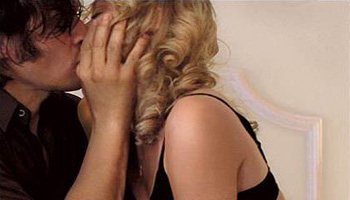
Half way through The Brown Bunny, after having driven and driven down long stretches of highway, Bud pulls off the road for some gas. He fills up the tank, then returns to the road, at which point many of the people in the theater where I saw the film chuckled. They thought he might do something besides refuel, I suppose. They were hoping something would happen.
Be careful what you wish for, my friends. In the end, Vincent Gallo, the godlike figure who dominates the film's credits and also plays Bud, provides the barest, cheapest of explanations for his character's moping in a sequence so counter to the movie's own minimalism that it makes you wish the whole thing had been a shaggy dog story. And I'm not talking about the scene that's caused the hubbub.
Tsai Ming-Liang, Abbas Kiarostami, Hou Hsiao-Hsien, the Dardenne brothers, and Claire Denis (who cast Gallo in her own Trouble Every Day) make movies in which very little seems to happen, but they convey a wealth of ideas non-verbally, subtly, cinematically, which must be harder than it looks given how few films actually pull it off. The Brown Bunny, written, directed, produced, photographed, shifted, shuffled, marketed, trumpeted, and over-sold by Gallo, tries hard to be in the company of such films, but instead it vacillates between inscrutability and triteness, never quite finding the balance required for poetry, let alone smooth exposition.
The film's most famous scene — a graphic sequence involving Gallo's genitals and Chloë Sevigny's lips — is as perfunctory as the coda that follows it in which the character's supposed complexity is explained and therefore robbed of its mystery. What you think of the sex scene depends largely on whether you buy the character, and by the end of the movie, I don't. I want to believe that a movie shows the actions of someone whom its filmmakers are trying to understand, but by the end of The Brown Bunny I felt like those actions had contrived their own stimuli, an unenlightening bottom-up construction.
Although I've never been to the Cannes film festival, The Brown Bunny probably isn't the worst movie ever shown there, as Roger Ebert has claimed. Gallo has selected a handful of good, mellow folk songs and woven them together with the sounds of the open road and pockets of silence. The ebb and flow of the soundtrack complement some nice images: endless streets as seen through windshields, a motorcycle shrinking into the distance as it speeds over the Bonneville Salt Flats, and idiosyncratic framing of faces, usually Gallo's.
The plot feels like a blend of Easy Rider and Eyes Wide Shut, and I'd say the movie falls somewhere between those two, better than the former and nowhere near as good as the latter. Like Tom Cruise in Kubrick's film, Gallo turns the head of every woman he meets, but the echoes and repetitions in Eyes Wide Shut are multi-faceted meditations on married life, and each of its encounters brings to mind the character's wife, even when she isn't physically present. Gallo is aiming for something similar, but he goes about it much more awkwardly. He names all of the women in the movie after flowers and makes sure their names are written on necklaces and purses so we'll make the connection. They're Bud's stand-ins for the absent Daisy.
When every other scene looks like a cola, jean, or motorcycle commercial, the kind of ad in which the people look perfectly unposed, their hair proudly mussed, Gallo's motivations seem too compromised for his film to say very much about life on this planet. In the theater, I had the sense that I was surrounded by people of two minds: there were those who wanted the movie to do something, be something, make some sense, and there were those who just wanted it to immerse them in a mood. Me, I'd have voted for the mood — Gerry with a black van and a motorcycle — but others have seen a decent short film in the last half hour, driven by plot and psychology. Gallo himself seems to be of both minds. He's produced a tone poem with a melodramatic plot twist and a graphic sex scene.
